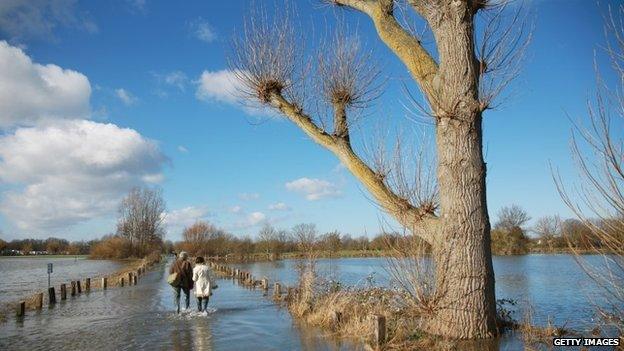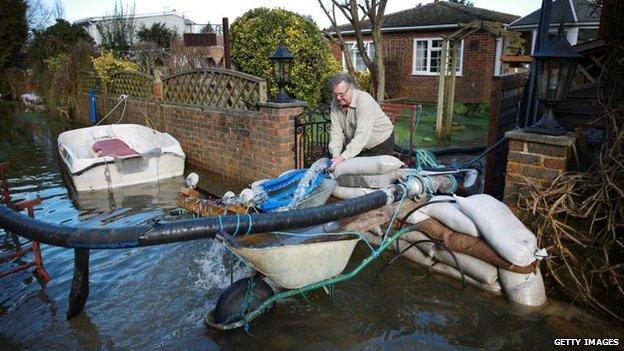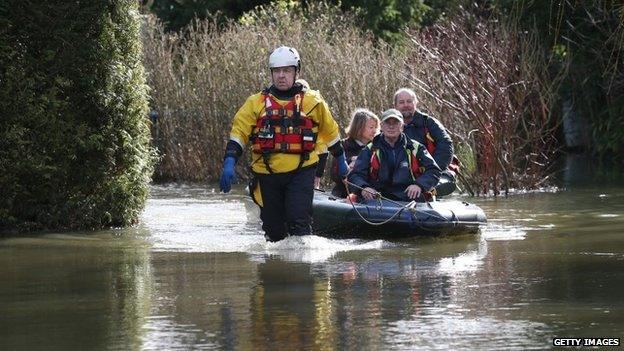UK storms: Hammond says climate change 'clearly a factor'
- Published

Communities along the River Thames have been badly hit by flooding and have 14 severe flood warnings in place
Climate change is "clearly a factor" in the period of stormy weather the UK has been experiencing, the defence secretary has said.
Philip Hammond told the Andrew Marr Show the storms and flooding had caused "quite serious damage" to the country's infrastructure.
Earlier, Labour leader Ed Miliband said global climate change was an issue of national security for Britain.
Their comments come as more flooding is expected in many parts of the country.
Despite a let-up in the stormy weather, there are 14 severe flood warnings, external - indicating a "danger to life" - for south-east England close to the River Thames and two for the Somerset Levels, which have experienced weeks of flooding.
Ed Miliband: "There can be no more fundamental security than people's lives"
As well as the impact to the transport network, about one million properties had their power cut off in the last week and thousands in southern England and Wales are still without power, according to the Energy Networks Association.
'Science is clear'
Some Conservative MPs and peers have challenged the argument that the recent storms were connected to global temperature changes.
Former chancellor Lord Lawson, who is among the most prominent climate change sceptics, told BBC Radio 4's Today programme on Thursday it was "not the case" that the storms were due to global warming.
However, Mr Miliband said: "What we've learnt from what's happened over the last few weeks, tragically, is that the costs of not acting on climate change in terms of the billions of pounds that are lost in terms of businesses and families as well as the human costs are greater than the costs of acting."
He added: "Climate change will mean more floods and more storms and that's why we've got to treat it like any other national security issue and that means uniting as a country behind a national effort to do more to defend against the floods, to invest in clean energy and to show leadership internationally to persuade other countries to be part of the fight against climate change."
Earlier, he told the Observer, external that "because of political division in Westminster we are sleepwalking into a national security crisis on climate change".

Homes along the River Thames have been flooded, with victims having to pump water away from their properties

The Committee for Climate Change says extra government money would not address a long-term flood risk
Mr Hammond said climate change is "clearly happening".
"It is clearly a factor in the weather patterns that we are seeing", he said
"That's why we are investing significant amounts of money in increasing our flood resilience in the UK."
He said although the floods were "a terrible tragedy" for those affected, "hundreds of thousands of properties" had been protected from flooding "by the investment we've made over recent years".
A spokeswoman for the Department of Energy and Climate Change (DECC) said Britain had adopted some of the most "ambitious climate change targets in the world" to reduce greenhouse gases by 50% by 2030.
The government will spend £2.4 billion on flood management and protection from coastal erosion over four years, which is "more than ever before", the spokesman said.
Liberal Democrat energy secretary Ed Davey also challenged Mr Miliband to "stop threatening to choke the renewables industry with his price freeze".
'No definitive answer'
It comes as the US Secretary of State John Kerry has urged the global community to act against climate change, saying "the window of time" is closing to prevent the worst consequences.
His comments coincide with the release of new research, which suggests the main system that helps determine the weather over northern Europe and North America may be changing.
The study, presented at the annual meeting of the American Association for the Advancement of Science in Chicago, showed the so-called jet stream through the upper atmosphere had increasingly taken a longer, meandering path resulting in weather remaining the same for more prolonged periods.
Last week, the Met Office's chief scientist, Dame Julia Slingo, said there was "no definitive answer" as to what had caused the period of stormy weather in the UK but that "all the evidence suggests there is a link to climate change".
The independent Committee for Climate Change - which advises the government on emissions targets and climate change - has also said a greater priority should be given to flood defence and protection.
The committee itself said that while an extra £130m pledged by the government would bring some comfort to flooded communities, it would not address the rising long-term flood risk.
In its latest blog, external, the committee said the new money would primarily be spent on repairing and reinstating defences that had been damaged in the recent storms, and so help recover existing levels of protection.
